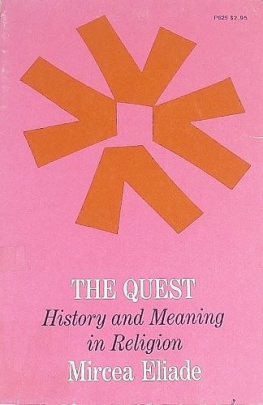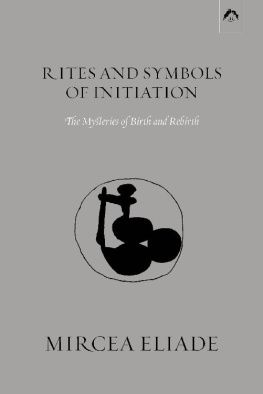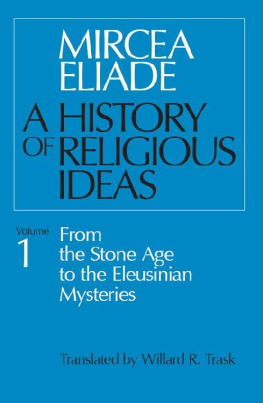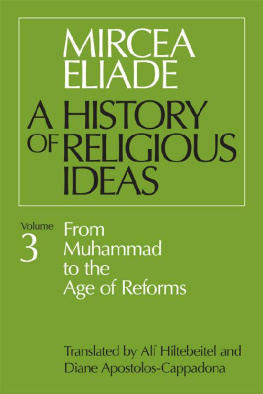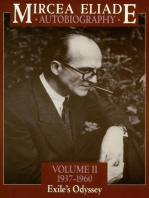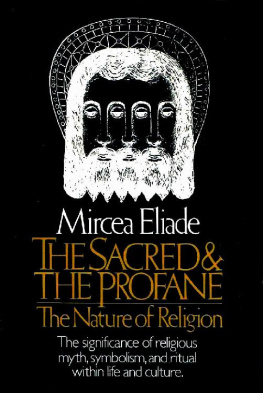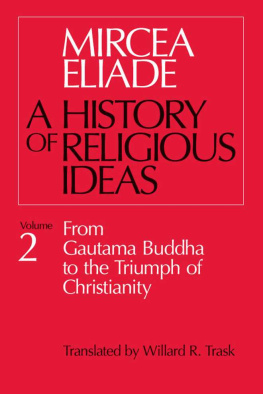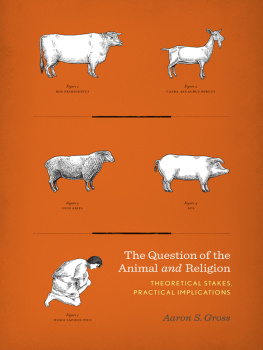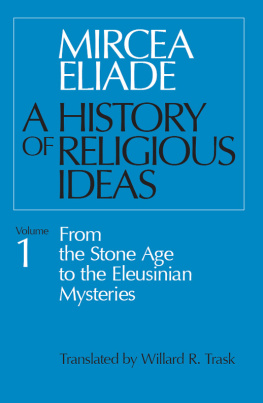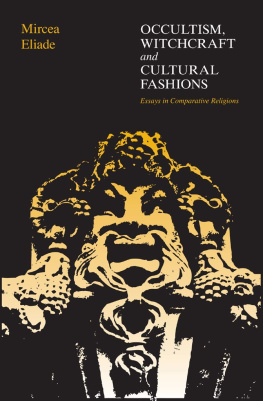Mircea Eliade - The Quest: History and Meaning in Religion
Here you can read online Mircea Eliade - The Quest: History and Meaning in Religion full text of the book (entire story) in english for free. Download pdf and epub, get meaning, cover and reviews about this ebook. year: 0, genre: Religion. Description of the work, (preface) as well as reviews are available. Best literature library LitArk.com created for fans of good reading and offers a wide selection of genres:
Romance novel
Science fiction
Adventure
Detective
Science
History
Home and family
Prose
Art
Politics
Computer
Non-fiction
Religion
Business
Children
Humor
Choose a favorite category and find really read worthwhile books. Enjoy immersion in the world of imagination, feel the emotions of the characters or learn something new for yourself, make an fascinating discovery.
- Book:The Quest: History and Meaning in Religion
- Author:
- Genre:
- Year:0
- Rating:4 / 5
- Favourites:Add to favourites
- Your mark:
- 80
- 1
- 2
- 3
- 4
- 5
The Quest: History and Meaning in Religion: summary, description and annotation
We offer to read an annotation, description, summary or preface (depends on what the author of the book "The Quest: History and Meaning in Religion" wrote himself). If you haven't found the necessary information about the book — write in the comments, we will try to find it.
The Quest: History and Meaning in Religion — read online for free the complete book (whole text) full work
Below is the text of the book, divided by pages. System saving the place of the last page read, allows you to conveniently read the book "The Quest: History and Meaning in Religion" online for free, without having to search again every time where you left off. Put a bookmark, and you can go to the page where you finished reading at any time.
Font size:
Interval:
Bookmark:
THE UNIVERSITY OF CHICAGO PRESS, CHICAGO 60637
THE UNIVERSITY OF CHICAGO PRESS, LTD., LONDON
1969 by The University of Chicago. All rights reserved
Published 1969. Midway reprint 1984
Printed in the United States of America
International Standard Book Number: 0-226-20386-7
Library of Congress Catalog Card Number: 69-19059
 The paper used in this publication meets the minimum requirements of the American National Standard for Information Sciences Permanence of Paper for Printed Library Materials, ANSI Z39.481984.
The paper used in this publication meets the minimum requirements of the American National Standard for Information Sciences Permanence of Paper for Printed Library Materials, ANSI Z39.481984.
ISBN 978-0-226-15937-9 (e-book)
THE QUEST
HISTORY AND MEANING IN RELIGION
MIRCEA ELIADE
The University of Chicago Press
CHICAGO AND LONDON
BY THE SAME AUTHOR
The Myth of the Eternal Return
Patterns in Comparative Religion
The Sacred and the Profane
Yoga: Immortality and Freedom
Birth and Rebirth
Myths, Dreams and Mysteries
Images and Symbols
The Forge and the Crucible
Myth and Reality
Shamanism: Archaic Techniques of Ecstasy
Mephistopheles and the Androgyne
From Primitives to Zen
Preface
It is unfortunate that we do not have at our disposal a more precise word than religion to denote the experience of the sacred. This term carries with it a long, although culturally rather limited, history. One wonders how it can be indiscriminately applied to the ancient Near East, to Judaism, Christianity, and Islam, or to Hinduism, Buddhism, and Confucianism as well as to the so-called primitive peoples. But perhaps it is too late to search for another word, and religion may still be a useful term provided we keep in mind that it does not necessarily imply belief in God, gods, or ghosts, but refers to the experience of the sacred, and, consequently, is related to the ideas of being, meaning, and truth.
Indeed, it is difficult to imagine how the human mind could function without the conviction that there is something irreducibly real in the world, and it is impossible to imagine how consciousness could arise without conferring meaning on mans drives and experiences. The awareness of a real and meaningful world is intimately related to the discovery of the sacred. Through the experience of the sacred, the human mind grasped the difference between that which reveals itself as real, powerful, rich, and meaningful, and that which does noti.e., the chaotic and dangerous flux of things, their fortuitous, meaningless appearances and disappearances.
I have discussed the dialectics of the sacred and its morphology in previous publications, and I do not need to take it up again. It suffices to say that the sacred is an element in the structure of consciousness, not a stage in the history of consciousness. A meaningful worldand man cannot live in chaosis the result of a dialectical process which may be called the manifestation of the sacred. Human life becomes meaningful by imitating the paradigmatic models revealed by supernatural beings. The imitation of transhuman models constitutes one of the primary characteristics of religious life, a structural characteristic which is indifferent to culture and epoch. From the most archaic religious documents that are accessible to Christianity and Islam, imitatio dei as a norm and guideline of human existence was never interrupted; as a matter of fact, it could not have been otherwise. On the most archaic levels of culture, living as a human being is in itself a religious act, for alimentation, sexual life, and work have a sacramental value. In other words, to beor, rather, to becomea man means to be religious.
Thus, philosophical reflection was confronted from the very beginning with a world of meaning which was, genetically and structurally, religiousand this is true generally, not only with regard to the primitives, the Orientals, and the pre-Socratics. The dialectics of the sacred preceded and served as a model for all the dialectical movements subsequently discovered by the mind. The experience of the sacred, by disclosing being, meaning, and truth in an unknown, chaotic, and fearful world, prepared the way for systematic thought.
This may be enough to arouse the interest of philosophers in the work of historians and phenomenologists of religion, but there are other aspects of the religious experience which are no less interesting. The hierophaniesi.e., the manifestations of the sacred expressed in symbols, myths, supernatural beings, etc.are grasped as structures, and constitute a prereflective language that requires a special hermeneutics. For more than a quarter of a century, historians and phenomenologists of religion have attempted to elaborate such a hermeneutics. This type of work does not resemble the antiquarians endeavor, although it may utilize documents from cultures long since vanished and from spacially remote peoples. By means of a competent hermeneutics, history of religions ceases to be a museum of fossils, ruins, and obsolete mirabilia and becomes what it should have been from the beginning for any investigator: a series of messages waiting to be deciphered and understood.
The interest in such messages is not exclusively historical. They do not only speak to us about a long-dead past, but they disclose fundamental existential situations that are directly relevant to modern man. As I have pointed out in one of the chapters of this book, a considerable enrichment of consciousness results from the hermeneutical effort of deciphering the meaning of myths, symbols, and other traditional religious structures; in a certain sense, one can even speak of the inner transformation of the researcher and, hopefully, of the sympathetic reader. What is called the phenomenology and history of religions can be considered among the very few humanistic disciplines that are at the same time propaedeutic and spiritual techniques.
In a progressively secularized society, these types of studies will probably become even more relevant. Seen from a Judeo-Christian perspective, the secularization may be at least partially misinterpreted. It may be considered, for example, a continuation of the process of demythologizing, which is in itself a late prolongation of the prophets struggle to empty the Cosmos and cosmic life of the sacred. But this is not the whole truth. In the most radically secularized societies and among the most iconoclastic contemporary youth movements (such as the hippie movement, for example), there are a number of apparently nonreligious phenomena in which one can decipher new and original recoveries of the sacredalthough, admittedly, they are not recognizable as such from a Judeo-Christian perspective. I do not refer to the religiosity evident in so many social and political movements, such as civil rights, antiwar manifestations, etc. More significant are the religious structures and (as yet unconscious) religious values of modern art, of some important and immensely popular films, of a number of phenomena related to youth culture, especially the recovery of the religious dimensions of an authentic and meaningful human existence in the Cosmos (the rediscovery of Nature, the uninhibited sexual mores, the emphasis on living in the present and freedom from social projects and ambitions, etc.).
Most of these recoveries of the sacred point to a type of cosmic religion that disappeared after the triumph of Christianity, surviving only among the European peasants. Rediscovering the sacredness of Life and Nature does not necessarily imply a return to paganism or idolatry. Although in the eyes of a Puritan the cosmic religion of the southeastern European peasants could have been considered a form of paganism, it was still a cosmic, Christian liturgy. A similar process occurred in medieval Judaism. Thanks mainly to the tradition embodied in the Kabbalah, a cosmic sacrality, which seemed to have been irretrievably lost after the rabbinical reform has been successfully recovered.
Next pageFont size:
Interval:
Bookmark:
Similar books «The Quest: History and Meaning in Religion»
Look at similar books to The Quest: History and Meaning in Religion. We have selected literature similar in name and meaning in the hope of providing readers with more options to find new, interesting, not yet read works.
Discussion, reviews of the book The Quest: History and Meaning in Religion and just readers' own opinions. Leave your comments, write what you think about the work, its meaning or the main characters. Specify what exactly you liked and what you didn't like, and why you think so.

